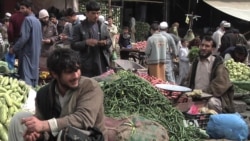Sahib Rehman Faizy stood in his narrow shop full of brightly-colored Afghan clothing for women and reminisced about when business was good. A refugee from neighboring Afghanistan, he has lived in Pakistan's capital city of Islamabad for more than 20 years. Like many other Afghan refugees, he was able to set up a successful business.
A bit of harassment by local police was always a problem, he said, but the situation has deteriorated significantly since December, when armed militants stormed a school in Peshawar and killed more than 130 children.
Afghan officials and human rights organizations assert that Pakistani authorities are using the attack as a pretext to push Afghan refugees out.
“Pakistani officials should not be scapegoating Afghans because of the Taliban’s atrocities in Peshawar,” Phelim Kine, deputy director of the Asia Division at Human Rights Watch, wrote in a recent press release.
Pakistan hosts almost 3 million Afghan refugees, nearly half of them undocumented. Many have lived in the country for decades. The government wants to repatriate most of them by the end of 2015. It has asked Afghanistan and the United Nations to create incentives, like housing and jobs, to encourage people to return home.
Tasneem Aslam, the spokesperson for Pakistan's Ministry of Foreign Affairs, denied the allegations that her country was mistreating the refugees. She said Pakistan was fully “engaged with the Afghan government” to help the refugees get back home with “dignity.”
Afghanistan, however, faces serious economic and security problems. Many refugees are hesitant to return to an environment where their safety and livelihood are at risk.
Asadullah arrived from Afghanistan when he was four years old. He now has 10 children of his own. He feels more affinity with Pakistan than with his native country. He also is skeptical of the idea that returning refugees could find a decent living across the border.
“They have cut down orchards and demolished houses. It’ll take a long while to rebuild,” he said.
Harassment and bribes
At a wholesale fruit and vegetable market considered a hub of Afghan refugees, traders and laborers said Pakistani police were using the current political climate as an excuse to extort money.
Fruit trader Zafar Khan said he saw police stop cars at a checkpoint and order men and women out of their vehicles - even those with proper documentation.
“They had Afghan refugee cards. They were taken out of their cars and harassed. And 500 or 1,000 rupees [$5 to $10] were taken from them,” said Khan.
The bribes, he said, varied according to the economic situation of the refugees.
Still, many refugees prefer bribes to the days when they said police seemed to be under orders to arrest at least 100 to 200 Afghans and did not care whether someone had proper documents or not.
On those days, police arrived in several Datsun cars and parked them at different entrances to the fruit and vegetable market, Afghans working there said. The police gathered anyone who looked like an Afghan and took them to a police station. This has happened several times since the attack in Peshawar, according to people working in the market.
Some Afghans in Pakistan also complain of police entering their homes and harassing women.
“Are the police allowed to enter a house when only women are inside? Isn’t it wrong?” asked Sahib Faizy. Traditional Afghan culture puts a lot of emphasis in separating the sexes.
According to the Islamabad office of the United Nations High Commissioner for Refugees, the situation has improved for documented Afghan refugees since its official protest in mid-January.
Meanwhile, according to the International Organization for Migration, almost 45,000 undocumented Afghans in Pakistan have been forced to return home to an uncertain future.





